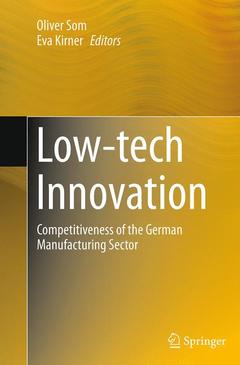Description
Low-tech Innovation, Softcover reprint of the original 1st ed. 2015
Competitiveness of the German Manufacturing Sector
Coordinators: Som Oliver, Kirner Eva
Language: English
Subjects for Low-tech Innovation:
Publication date: 08-2016
Support: Print on demand
Publication date: 11-2014
229 p. · 15.5x23.5 cm · Hardback
Description
/li>Contents
/li>Biography
/li>Comment
/li>
Oliver Som is senior researcher at the Fraunhofer Institute for Systems and Innovation Research ISI at Karlsruhe. Prior to joining Fraunhofer ISI in 2005, he studied political and social sciences at the University of Stuttgart. Since 2013 he is deputy head of the Competence Center 'Industrial and Service Innovations' (ISI) and coordinates the business unit 'Industrial innovation strategies and systems assessment'. Alongside his occupation at ISI, he obtained his Ph.D. at the University of Flensburg, Chair for Innovation Research and -Management for his research on 'Innovation patterns of non-R&D-performing firms in the German manufacturing industry' and is a visiting lecturer at several renowned universities. His research and teaching focuses on innovation strategies and innovation systems in (non-R&D-intensive) industries and firms in the manufacturing sector, the diffusion and impacts of technical and organisational process innovation, and the evaluation and design of industrial innovation and technology policy.
Eva Kirner is professor for International Management with special focus on Innovation Management at the Business School of Furtwangen University (HFU). She has studied business administration at Mannheim University and obtained her PhD from Dortmund University on research about firm networks. Prior to joining HFU Business School, she has been head of a research unit at the Fraunhofer Institute for Systems and Innovations Research (ISI) where she has lead national and international research projects in the areas of innovation management, innovation measurement as well as competence and organizational development. Her teaching and research focus are on the fields of organizational behaviour, innovation management and creativity.




